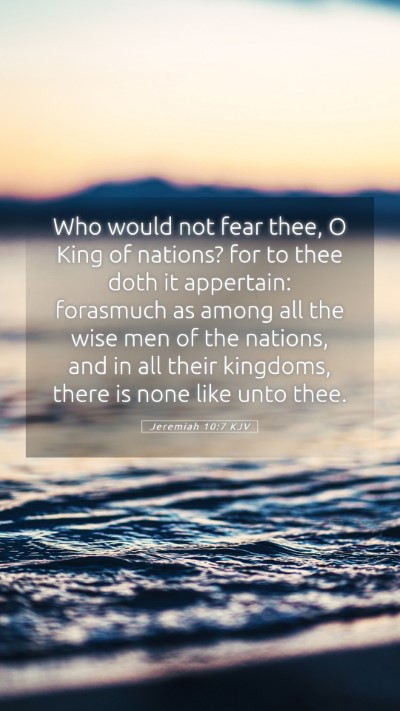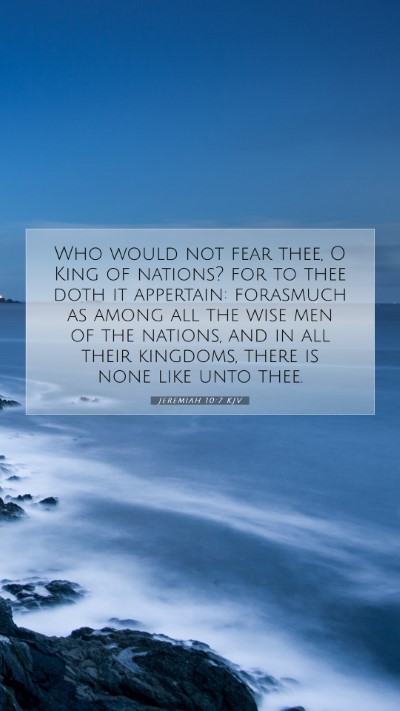Bible Verse Commentary on Jeremiah 10:7
Jeremiah 10:7 states: “Who would not fear you, O King of the nations? This is your due; among all the wise men of the nations and in all their kingdoms, there is no one like you.”
This verse highlights the supreme majesty and uniqueness of God in comparison to all other entities, particularly the idols worshiped by the nations. Here, we will explore the meaning of Bible verses like Jeremiah 10:7 through the insights provided by renowned public domain commentaries, including works by Matthew Henry, Albert Barnes, and Adam Clarke.
Understanding the Context
Jeremiah, a prophet during the time leading up to the Babylonian exile, addresses both the Israelites and surrounding nations in his prophecies. The people had turned to idol worship, neglecting the worship of the true God. This verse is part of a larger condemnation against the practice of idolatry.
Key Insights from Commentaries
-
Matthew Henry:
Henry notes that this verse serves as a declaration of God's deserving reverence and fear. It emphasizes that, among all nations and wise men, none can compare to the sovereignty and power of God. The phrase “King of the nations” reflects God’s authority not just over Israel, but over all creation.
-
Albert Barnes:
Barnes discusses the idea that true wisdom and understanding come from acknowledging God. He also highlights the folly of idol worship, asserting that those who create and worship idols demonstrate a disconnection from true wisdom. This further cements the argument for the distinction between the Creator and creations.
-
Adam Clarke:
Clarke provides an analysis of the fear of God mentioned in the verse, suggesting that it is a recognition of His power and holiness. He points out that the verse invites nations to recognize their dependency on God, contrasting the infinite wisdom of God with the finite understanding of mankind.
Theological Implications
Jeremiah 10:7 calls for an acknowledgment of God's greatness and invites an understanding of the reverent fear due to Him. The verse challenges individuals and nations alike to consider who they are placing their trust in. The implications of this verse can be profound in personal faith and corporate worship.
Bible Verse Interpretations
Different interpretations arise from various Bible study insights. An understanding of Scripture brings clarity to the importance of recognizing God’s unique status in faith and worship practices. The verse acts as a reminder to avoid the distractions of modern-day idols, steering believers towards a deeper commitment to God.
Application for Daily Life
In applying this verse to daily life, believers are encouraged to assess their priorities and the objects of their fear and reverence. Are they placing God at the center of their lives? This passage stresses the importance of knowing that true wisdom and peace come from a relationship with God, not from worldly wisdom or material possessions.
Cross References
- Psalm 86:8-10: Declares the uniqueness of God.
- Isaiah 40:18-20: Speaks of the futility of comparing God with idols.
- 1 Corinthians 8:4-6: Talks about knowledge concerning idols and the one true God.
- Jeremiah 10:10: Further emphasizes God's everlasting reign and truth.
- Revelation 15:4: Exclaims God's righteous judgments among the nations.
This analysis of Jeremiah 10:7 aims to enrich your understanding of Scripture and provoke meaningful reflection on the nature of worship. For those engaging in online Bible study or Bible study groups, this verse and its interpretations can serve as a significant topic of discussion.
For readers seeking Bible study resources, this verse can open discussions about the historical context of idolatry in ancient cultures as well as its relevance in today's society. Reflecting on the implications of trusting in God over idols can enhance one's personal faith journey.


